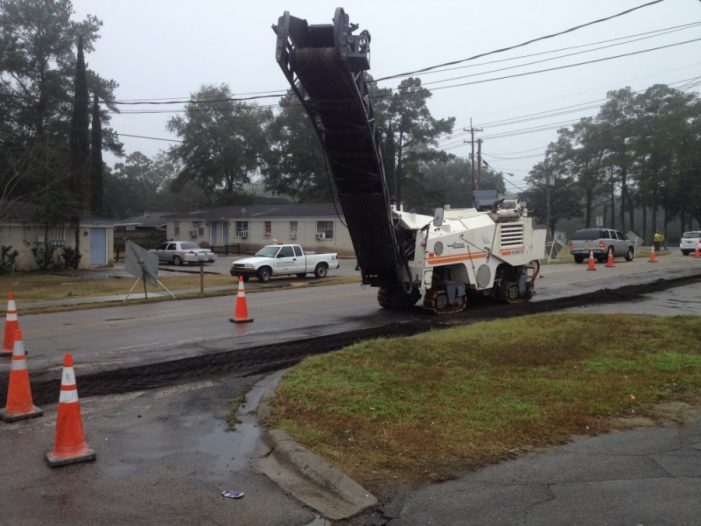One of the most hotly contested contracts awarded by the City of Tallahassee is the the contract to pave the streets of the capital city. The current holder of the contract, Capital Asphalt, won the contract two years ago after Peavy and Sons Construction held the contract for a number of years.
Now the contract is up for bid again and City staff has asked the City Commission to award the contract to Peavy and Sons Construction. The award is scheduled to be voted on by the full City Commission on Wednesday.
A review of the bid documents (see bid tabulations here) show that Peavy and Sons had the lowest bid by approximately $9,000 under Capital Ashpalt. Peavy and Sons bid $1,685,100 per year and Capital Asphalt bid $1,694,275.
Two other companies submitted bids that were significantly higher.
However, a detailed review of the 30 items that were bid by each company show an irregular trend in pricing by the winning bidder that is raising questions.
For the “spot milling” part of the contract (see items 27, 28, &29 of bid tabulations), which constitutes about 3% of the total contract, Peavy and Sons bid $16,750. In comparison, Capital Asphalt bid $63,500, CW Roberts bid $66,250, and Roberts and Roberts bid $76,250.
The Peavy and Sons bid is approximately 25% of the lowest bid for the spot milling services provided by the other three bidders.
What is the impact of the low bid on the spot milling services?
If Peavy and Sons had bid the lowest of the three other contractors for the “spot milling”, Peavy and Sons would have finished second in the bidding.
Is the low bid for the spot milling items against any rules?
According to the Section 19.0 of the instructions provided to the bidders by the City for this project, bids can be rejected ” if the unit prices are obviously unbalanced (either in excess or below reasonably expected values), or irregularities of any kind.”
Why are excessively low bids against the rules?
Tallahassee Reports, through discussions with procurement experts and independent research has learned that excessively low bids on specific items might indicate some form of collusion.
For example, if one bidder finds out that some of the 30 items included in the request for proposal will not be requested during the term of the contract or at a level lower than is being requested in the bid, that bidder can bid lower than the other bidders that do not have the same information.
If the above scenario took place, the low bid for the entire project would actually cost taxpayers more money in the long run.
Tallahassee Reports has learned that during the last asphalt paving contract awarded by the City, approximately $5,000 of spot milling was requested by the City annually. The request for proposal by the City for the upcoming year, puts the annual level of spot milling at approximately $65,000.
Why the increase in spot milling services?
Tallahassee Reports sought out City officials for comment, but City Hall is closed due to Veterans Day. We will try to get a response from City officials tomorrow.


Hi,
I used to work for F.D.O.T. in market analysis section. My job was to review bids for bid collusion for 20 years. i have lots of inside information about the same subjects that might be useful to you. send me and email and I will send you mu phone number. I have some info about the project in hand in Capital Circle close to airport.
Move along people, nothing to see here….just move along.
How is this bid any different from all the other bids? It’s all crony capitalism at its best and something the City of Tallahassee is good at pulling off. Propbably more stories here than we can imagine. And if the winning bidder ends up not the “chosen” one is another story all together.
Or it could be that companies will go as low as they can go to win bids. Then once they win, they nickel and dime to make up the difference in their ridiculously low-bid.
Or, it could be that the other companies colluded. Are the other companies closely related? Three or four bids is an awfully small sample to make assumptions about bid manipulation. I have purchased milled asphalt from Peavy and Sons. It could be that Peavy and Sons is able (or willing) to re-sell the milled asphalt to the general public, can actually make a little money on the resell of the salvaged asphalt and has passed that savings on to the residents of Leon County. Thank you Peavy and Sons for the great product and the taxpayer cost saving measures. Win – Win